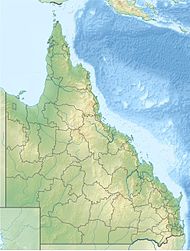The Culgoa Floodplain National Park is a protected national park that is located in the South West region of Queensland in eastern Australia. The 42,859-hectare (105,910-acre) national park is situated at the western extent of Hebel in the Shire of Balonne and in the east of Jobs Gate in the Paroo Shire, approximately 630 kilometres (390 mi) west of Brisbane. The park occupies the former pastoral and grazing property of Byra Station.[1] The park's southern boundary is defined by part of the state border between Queensland and New South Wales.
| Culgoa Floodplain National Park Queensland | |
|---|---|
 Painted Honeyeater (Grantiella picta) Jandowae, S. Queensland, Australia | |
| Nearest town or city | Hebel |
| Coordinates | 28°49′21″S 146°49′33″E / 28.82250°S 146.82583°E |
| Established | 1994 |
| Area | 428.59 km2 (165.5 sq mi) |
| Managing authorities | Queensland Parks and Wildlife Service |
| Website | Culgoa Floodplain National Park |
| See also | Protected areas of Queensland |
Location and features
editIn the eastern tip of the park, the waters of the Culgoa River may cause flooding. The west of the park lies within the catchment area of Nebine Creek. In some areas water from the Great Artesian Basin naturally rises to the surface, forming muddy pools.[1]
The park is covered with diverse woodland vegetation. Stone tool scatters and cooking sites within the park are important reminders of the area's Aboriginal heritage.[2] 150 species of bird have been identified in the park.[2] Among others, there are ten honeyeaters, Australia's six species of woodswallow and parrots.
Bushwalking, birdwatching and other wildlife observing are the park's main recreational activities.
The Culgoa Floodplain National Park is only accessible by 4WD vehicles.[2]
Camping is permitted however there are no facilities provided.[2] There are no marked walking tracks.
The average elevation of the terrain is 142 metres.[3]
See also
editReferences
edit- ^ a b "Nature, culture and history". Department of National Parks, Recreation, Sport and Racing. 9 October 2013. Retrieved 29 August 2014.
- ^ a b c d "About Culgoa Floodplain". Department of National Parks, Recreation, Sport and Racing. 9 October 2013. Retrieved 29 August 2014.
- ^ "Culgoa Floodplain National Park topographic map, elevation, relief". topographic-map.com. Retrieved 9 March 2022.
External links
edit
